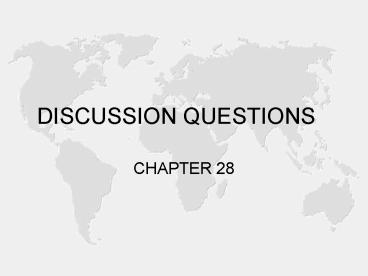DISCUSSION QUESTIONS - PowerPoint PPT Presentation
1 / 10
Title: DISCUSSION QUESTIONS
1
DISCUSSION QUESTIONS
- CHAPTER 28
2
What were the causes of World War I?
- Militarism
- growth of military distracts people form social
tensions - Alliances
- 2 rival ones (Britain, France, Russia)
(Germany, Austria-Hungary Italy) focus on
Balkans - Imperialism
- no more territory to expand in
- Nationalism
- social tensions, Austria-Hungary trouble with
Slavic nationalism, Russia with workers peasants
3
What was the impact of World War I on the worlds
societies economies?
- Russia revolution, Lenin communists into
power, lost land to Germany - weakens Europe internally and as a world power,
decreases birth rate, destruction of industrial
property ag land, post war instability,
inflation, loses export markets - change of ownership of colonies (temporary),
self-determination, conflict against colonial
rule - Ottoman Empire collapses changes in Middles
East (politically fragmented) - greater international competition, debts to U.S.
creditors
4
What were the causes of the Great Depression?
- WWI inflation, loss of European export markets
- overproduction of food
- world dependent areas suffering, production
exceeds demand, prices in income down, cannot buy
manufactured goods - little world leadership, nationalismselfishness
- western nations insisted on debt repayment,
tariffs, protectionism
5
What was the worldwide impact of the Great
Depression?
- Russia little impact, internal development
inward looking - unemployment worldwide
- no ability to buy commodities, thus no export
income, thus no ability to buy consumer goods - Japan export based, bad harvests
- Latin America more state involvement in economy
- West welfare programs
- global no one country could get out on its own
6
How were the diplomatic problems of World War II
settled?
- - United Nations true internationalism
- divided Germany
- dividing Europe between USA USSR
- divided Austria
- Japan occupied by USA
- Poland given part of Germany in return for land
given to USSR - Korea split
- 3 meetings in Tehran, Yalta Potsdam between
Roosevelt/Truman, Stalin Churchill
7
In what ways did the period from 1914-1945 mark
the end of the old world order?
- Rise of the United States and Soviet Union
- world split between democracy communism
- colonialism on the way out
- stage set for decolonization Cold War
- nationalism with new independent states being
created.
8
What were the consequences of the ending of the
Cold War?
- arms limitations agreements
- decolonization many new nations created, align
with a super-power or non-alignment - economic interactions increase
- multinational companies produce all over the
world, especially where there was cheap labor - collapse of the Soviet Union (economics)
9
Discuss the proposition that both the causes and
the outcome of World War II were the result of
problems created in the Treaty of Versailles?
- world not represented there only USA, Britain,
France Italy - revenge sought against Germany
- Italy wants more than it gets
- Japan wants more power (doesnt get it)
- USA isolationism (not join League of Nations)
Britain France fearful of future) - China loses land to Japan
- Germany beat into the ground loses land,
military, colonies, reparation payments - Russia loses land
- preconditions set up for future strife
10
Discuss the influence of global wars and the
Great Depression on the destruction of Western
global dominion.
- economics loss of export markets, loss of
colonies as sources of raw materials and markets
for finished products - nationalism loss of land, colonies
- war loss of prestige, cannot take care of
themselves - regional conflicts regional identities
- rise of United States takes over European
countries in terms of power - regional trade blocs
- common commercial policies































